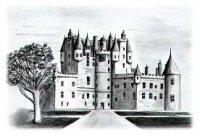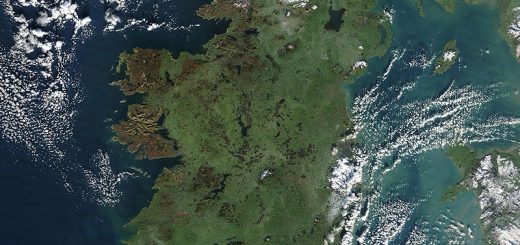Dozmary Pool
Dozmary Pool is associated with many legends. It is suspected of being the body of water into which Sir Bedivere threw Excalibur after King Arthur was mortally wounded. The pool is also said to be a haunt of the Lady of the Lake, guardian of Excalibur. It is also said to be bottomless and to have a tunnel connecting it to the sea.
 Dozmary pool the name of which means ‘drop of sea’, dried up in the year 1869 quashing any notions of truth to the legend. Neolithic arrowheads were found in the dried pools bed.
Dozmary pool the name of which means ‘drop of sea’, dried up in the year 1869 quashing any notions of truth to the legend. Neolithic arrowheads were found in the dried pools bed.
The site is also linked with local legends of Jan Tregeagle who was charged with emptying the pool with a broken limpet shell.
Directions: The pool is reached off a minor road from the A30 near the Jamaica Inn from Bolventor.




Re: Dozmary Pool
Dozmare Pool (pronounced Dosmery)–i.e., Dos, a drop; Mor and Mari, the sea, from the old tradition that it was tidal–890 feet above the sea, a melancholy sheet of water, about one mile in circumference, and from 4 to 5 feet in depth. The lofty hill called Brown Willy, is the mark by which the traveller can direct his course. On the north side of the hill are the remains of an ancient village, probably of tinners or streamers, as they are locally called. Below this the pool is situated, on a tableland which borders the deep vale of the Fowey. The pool is the theme of many a marvellous tale, in which the peasants most implicitly believe. It is said to be unfathomable, and the resort of evil spirits. Begirt by dreary hills, it presents an aspect of utter gloom and desolation, and is said to have supplied some features for the "middle meer" in the Laureate’s "Morte d’Arthur," into which Sir Bedivere at last flung Excalibur, having twice before concealed the "great brand"
‘There in the many-knotted waterflags
That whistled stiff and dry about the marge.’
The country people represent the pool as haunted by an unearthly visitant, a grim giant of the name of Tregeagle, who, it is said, may be heard howling here when wintry storms sweep the moors. He is condemned to the melancholy task of emptying the pool with a limpet-shell, and is continually howling in despair at the hope-lessness of his labour. Occasionally, too, it is said this miserable monster is hunted by the devil round and about the tarn, when he flies to the Roche Rocks, some 15 miles distant, and, by thrusting his head in at the chapel window, finds a respite from his torments. Other versions of the legend place Tregeagle on the coast near Padstow, where he is condemned to make trusses of sand and ropes of sand to bind them; or at the mouth of the estuary at Helston, across which he was condemned to carry sacks of sand until the beach should be clean of the rocks.
[The Legendary Lore Of The Holy Wells Of England by Robert Charles Hope (1893)]
Re: Dozmary Pool
The Haunted Homes and Family Traditions of Great Britain by John Ingram (1897)
Who, knowing anything of Cornwall, but is acquainted with Tregeagle, the Demon of Dosmery Pool, on Bodmin Downs? How long he has haunted "Old Cornwall" is difficult to sav: but his terrible howling, when the wintry blast rushes over the Downs, is proverbial, and "to roar like Tregeagle" is a time-honoured saying. Mr. R. Hunt, in his interesting Popular Romances of the West of England, recounts many exploits of this famous spirit, whose voice is still heard, and whose shadowy form is even still seen, when the winds are at their highest and the nights are the most stormy.
"Who has not heard of the wild spirit of Tregeagle?’ asks Mr. Hunt. "He haunts equally the moor, the rocky coasts, and the blown sand-hills of Cornwall. From north to south, from east to west, this doomed spirit is heard of, and to the Day of Judgement he is doomed to wander, pursued by avenging fiends. For ever endeavouring to perform some task by which he hopes to secure repose, and being for ever defeated. Who has not heard of the howling of Tregeagle? When the storms come with all their strength from the Atlantic, and urge themselves upon the rocks around Land’s End, the howls of the spirit are louder than the roaring of the winds. When calm rests upon the ocean, and the waves can scarcely form upon the resting waters, low wailings creep along the coast. These are the wailings of this wandering soul.
"When midnight is on the moor, or on the mountains, and the night winds whistle amidst the rugged cairns, the shrieks of Tregeagle are distinctly heard. We know that he is pursued by the demon dogs, and that till day-break he must fly with all speed before them."
This Tregeagle, whose attributes are so mysterious and, according to the district where related, so varied, is traditionally reported to be the spirit of a quot;tyrannical magistrate," a "rapacious and unscrupulous landlord who was " one of the Tregeagles who once owned Trevorcler, near Bodmin." At the demise of this hardened sinner, who had committed more crimes than the decalogue contained, the foul fiend wished to at once obtain possession of what he deemed rightly his, to wit, the criminal’s soul ; but the wretched man, in the agony of despair, consigned his -wealth to the priesthood, that they might fight with the evil spirits, and save his soul from its just doom.
The power of the priesthood so far prevailed, that as long as Tregeagle’s spirit had "some task difficult beyond the power of human nature " to perform, demoniac agency should be unable to carry him away. His tasks were to extend into eternity, so that repentance might have time to gradually work out his sin. His only chance of ultimate salvation was in perpetual toil: as long as he continued his labour the demons could do him no real harm. Frequent were the tussles he had with the fiends : on one occasion his restless spirit is said to have even given evidence in a court of law, when his relentless pursuers vainly endeavoured to carry him off.
Tregeagle’s first and most famous task was the emptying of Dosmery Pool, a mountain tarn, some miles in circumference; and local lore would have he is still engaged upon this endless operation. The difficulty of this gigantic labour was increased by the supposed fact that the lonely pool was bottomless ; and yet one learned ecclesiastic was not convinced of the hopelessness of the work, and, to decrease the prospect of it ever coming to an end, he proposed that the wretched sinner should only be provided with a limpet shell, with a large hole in it, for the purpose of baling out the water. The Evil One did not lose sight of the doomed Tregeagle, but kept a careful eye on him, and tried every possible means to divert his attention from his task, in order that he might make him his prey. Still the hapless spirit continued to toil, although on one occasion the fiends almost overcame him. Mr. Hunt’s graphic account of the terrific struggle is as follows:
"Lightnings flashed and coiled like fiery snakes around the rocks of Houghton. Fire-balls fell on the desert moors and hissed in the accursed lake. Thunders pealed through the heavens, and echoed from hill to hill; an earthquake shook the solid earth, and terror was on all living. The winds rose and raged with a fury which was irresistible, and hail beat so mercilessly on all things that it spread death around. Long did Tregeagle stand the ‘ pelting of the pitiless storm,’ but at length he yielded to its force and fled. The demons in crowds were at his heels. He doubled, however, on his pursuers and returned to the lake; but so rapid were they that he could not rest the required moment to clip his shell in the now seething waters. Three times he fled round the lake, and the evil ones pursued him. Then, feeling that there was no safety for him near Dosmery Pool, he sprang swifter than the wind across it, shrieking with agony, and thus since the devils cannot cross water, and were obliged to go round the lake he gaired on them and fled over the moor. Away, away wen( Tregeagle, faster and faster, the dark spirits pursuing, and they had nearly overtaken him, when he saw Roach Rock and its chapel before him. He rushed up the rocks, with giant power clambered to the eastern window, and dashed his head through it, thus securing the shelter of its sanctity. The defeated demons retired, and long and loud were their wild wailings in the air. The inhabitants of the moors and of the neighbouring towns slept not a wink that night."
But the baling out Dosmery Pool was by no means the only task assigned to Tregeagle’s unresting spirit. One labour, on the shore near Padstow, was to make trusses of sand and ropes of sand with which to bind up the trusses. Each recurring tide swept away the result of his toil, and, according to the tradition, " the ravings of the baffled soul were louder than the roarings of the winter tempest." By priestly influence Tregeagle was removed to the estuary of the Loo, and ordered to carry sand across to Porthleven, A malicious demon contrived to trip him up, and the contents of his enormous sack supplied the material of the sand-bank out of which was formed the bar that destroyed the harbour.
Land’s End was eventually assigned to Tregeagle as a place of labour, a place where, as Mr. Hunt says, " he would find no harbour to destroy, and few people to terrify. His task was to sweep the sands from Porthcurnow Cove round the headland called Tol-Peden-Penwith, into Nanjisal Cove. Those who know that rugged headland, with its cubical masses of granite piled in Titantic grandeur one upon another, will appreciate the task ; and when to all the difficulties are added the strong sweep of the Atlantic current, that portion of the Gulf stream which washes our southern shores, it will be evident that the melancholy spirit has. indeed, a task which must endure to the world’s end. Even until to-day is Tregeagle labouring at his task. In calms his wailing is heard ; and those sounds which some call the ‘ soughing of the wind,’ are known to be the moanings of Tregeagle; while the coming storms are predicted by the fearful roarings of this condemned mortal."
But these excerpts from Mr. Hunt’s account by no means exhaust the deeds or doings of this supernatural being, a thorough belief in whose continual existence is prevalent throughout the length and breadth of old Cornwall. Alluding to the widely diffused belief of a spectre huntsman, whose wild chase permeates the legends of so many lands, Mr. Hunt remarks, "The tradition of the Midnight Hunter and his headless hounds, always in Cornwall associated with Tregeagle, prevails everywhere. The Abbot’s Way, on Dartmoor, an ancient road which extends into Cornwall, is said to be the favourite coursing ground of the ‘ wish hounds of Dartmoor,’ called also the yell hounds.’ "
These "yell" or "yeth hounds" form the theme of the beautiful fragmentary "Legend of Dartmoor," by the late Oliver Madox Brown, a legend which the highly talented youth left, unfortunately, unfinished.